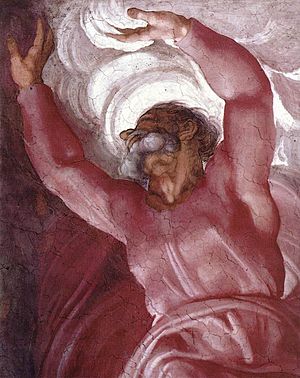Omnipotence facts for kids

Omnipotence means having unlimited power. In religions that believe in one God, like Christianity, Judaism, and Islam, this amazing power is usually given only to God.
In these religions, omnipotence is often listed as one of God's main qualities. Other qualities include omniscience (knowing everything) and omnipresence (being everywhere at once). When a single being has all these qualities, it can lead to big questions, like the problem of evil. This question asks why an all-powerful and all-good God would allow bad things to happen in the world.
Contents
What Does 'Omnipotence' Mean?
The word omnipotence comes from two Latin words: omni-, which means "all," and potens, which means "powerful." So, the term simply means "all-powerful."
Different Ideas of God's Power
People have thought about what "all-powerful" truly means in different ways. Here are a few ideas:
- Some believe God can do absolutely anything, even things that seem impossible or don't make sense.
- Others think God can do anything that fits with God's own nature. For example, if God's nature is to be truthful, then God cannot lie.
- Another idea is that God is always consistent. God would not go against God's own rules unless there was a very good reason to do so.
Understanding God's Power
Many thinkers, like Thomas Aquinas from the Middle Ages, found it tricky to fully understand God's power. He said that when we say "God can do all things," it really means God can do all things that are possible. This is why God is called omnipotent.
In this way of thinking, being all-powerful doesn't mean God can do things that are logically impossible. For example, God cannot make a square circle, because a "square circle" is a contradiction. It's better to say that such a thing cannot be done at all, rather than saying God cannot do it.
C. S. Lewis, a famous writer, agreed with this idea. He explained that God's power means God can do anything that is truly possible, but not things that are impossible in their very nature. He said that saying "God can give someone free will and also take it away" doesn't make sense. Nonsense words don't suddenly gain meaning just because we add "God can" in front of them.
When Power Is Limited
Some people who believe in one God think that God is not, or cannot be, unlimited in power. Or they believe that by giving humans free will, God chose to limit divine power.
In some Jewish and Christian groups, people believe God acts in the world by inspiring and guiding, rather than by forcing things to happen. They think God creates possibilities, but doesn't always perform miracles or break the laws of nature.
Philosophical Ideas About Power
Some philosophers argue that true power isn't about forcing things. Instead, it's about influence. If something is truly powerful, it must be able to influence other things that also have some power of their own.
Think of it this way: if you control a lump of jelly, your power isn't very impressive because the jelly can't resist you. But if you can influence someone who has their own ideas and strength, that shows greater power. So, for God's power to be truly great, it must be over beings that have some of their own power and choices. This idea suggests that God's power is about persuasion and influence, not just absolute force.
Uncertainty About Omnipotence
Some thinkers, like René Descartes, believed that an all-powerful being would be beyond human logic. This means that trying to explain or limit omnipotence using our human rules of logic might not fully work.
See also
 In Spanish: Omnipotencia para niños
In Spanish: Omnipotencia para niños
- Counterdependency
- Omnipotence paradox
- Theodicy
 | Ernest Everett Just |
 | Mary Jackson |
 | Emmett Chappelle |
 | Marie Maynard Daly |

